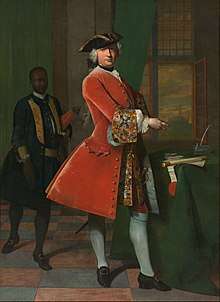Jan Pranger
Jan Pranger (1700 – 13 April 1773) was a Dutch merchant, who in 1730 became Director-General of the Dutch Gold Coast. A portrait of Jan Pranger by Frans van der Mijn is on display in the Rijksmuseum Amsterdam.[1]
Jan Pranger | |
|---|---|
 | |
| Director-General of the Dutch Gold Coast | |
| In office 6 March 1730 – 13 March 1734 | |
| Preceded by | Robert Norris |
| Succeeded by | Antonius van Overbeke |
| Personal details | |
| Born | 1700 Amsterdam, Netherlands |
| Died | 13 April 1773 Amsterdam, Netherlands |
| Spouse(s) | Elisabeth Oloff (1736–1739) Machteld Muilman (1745–1773) |
Biography
Early life and career on the Dutch Gold Coast
Jan Pranger was born in 1700 in Amsterdam to Jan Pranger Sr., a wine merchant, and Johanna van Eden. The family belonged to the middle class of the Dutch Republic. In 1720, Jan Pranger was employed by the Dutch West India Company as an assistant to the merchants in Elmina, one of the lowest administrative ranks available on the Dutch Gold Coast. He soon made career though, and in 1724 was made head of Fort Crèvecœur in Accra, an office which came with the rank of head merchant (Dutch: oppercommies) and with membership of the Colonial Council in Elmina.[2]
When Director-General Valckenier resigned in 1725, he advised the Colonial Council to install either Robert Norris or Jan Pranger as his successor. Probably because of his young age, Jan Pranger was passed in favour of Robert Norris, but when Norris resigned in 1729, he was eventually selected for the post of Director-General. Jan Pranger was officially installed on 6 March 1730.[3]
As Director-General, Pranger came into conflict with head merchant Hendrik Hertogh of the factory in Jaquim on the Dutch Slave Coast, which was subordinate to the Director-General of the Dutch Gold Coast. When in 1732 the factory in Jaquim was pillaged and burned by the Kingdom of Dahomey, Pranger sent a party under the leadership of Jacobus Elet to Dahomey to negotiate with the king. Although initially the mission seemed successful, in the end the relationship with Dahomey proved to be damaged beyond repair.[4]
Out of frustration with the situation in Dahomey, Pranger petitioned the Colonial Council with his resignation on 3 May 1733, and on 13 March 1734, his successor Antonius van Overbeke was installed. In June 1735, Pranger finally left the Gold Coast on a slave ship headed for Suriname. As he fell ill during the voyage, he only departed Suriname in the spring of 1736. He eventually arrived in the Dutch Republic on 15 June 1736.[5]
Later life

Almost immediately after his arrival, on 5 July 1736, he married Elisabeth Oloff, who died a little more than three years later, on 5 December 1739. Pranger remarried Machteld Muilman on 14 September 1745.[6]
Pranger had become a wealthy man in Africa. After his retirement from service in Africa, he owned in a house on the Singel canal in Amsterdam, and a country seat outside of the city. He employed four domestic servants and owned three horses.[7]
Notes
- Rijksmuseum.nl
- Den Heijer 2000, p. 27.
- Den Heijer 2000, pp. 29-30.
- Den Heijer 2000, pp. 30-32.
- Den Heijer 2000, p. 32.
- Den Heijer 2000, pp. 32-34.
- Den Heijer 2000, p. 34.
References
- Den Heijer, Henk (2000). Naar de koning van Dahomey: het journaal van de gezantschapsreis van Jacobus Elet naar het West-Afrikaanse koninkrijk Dahomey in 1733. Zutphen: Walburg Pers. ISBN 9057301369.CS1 maint: ref=harv (link)